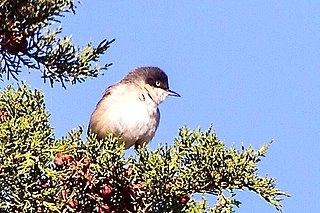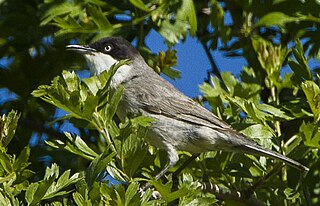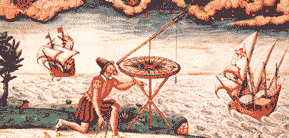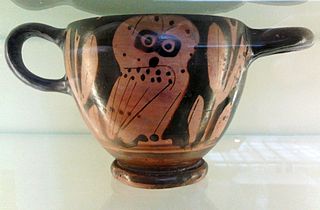
The western Orphean warbler is a typical warbler of the genus Sylvia. This species occurs in summer around the Mediterranean, through western Europe and extending into northwest Africa. It is migratory, wintering in sub-Saharan Africa. It is a rare vagrant to northern and north-western Europe.
A precept is a commandment, instruction, or order intended as an authoritative rule of action.

Brails, in a sailing ship, are small lines used to haul in or up the edges (leeches) or corners of sails, before furling. On a ship rig, these brails are most often found on the mizzen sail. The command is, hale up the brails, or, brail up the sails. The word brail comes from Middle English brayle, from Anglo-French braiel belt, strap, brail, alteration of Old French braiuel belt, probably ultimately from Latin braca pant.

The eastern Orphean warbler is a typical warbler of the genus Sylvia. This species occurs in summer around the Mediterranean, through the Balkans via Turkey, the Caucasus and surrounding regions to Central Asia. It is migratory, wintering in sub-Saharan Africa.

Thomas Webster, was a British painter of genre scenes of school and village life, many of which became popular through prints. He lived for many years at the artists' colony at Cranbrook in Kent.

Rock butter is a soft mineral substance found oozing from alum slates.
A butlerage was a duty of two shillings on every ton of wine imported into England by merchant strangers; so called because it was paid to the king's butler for the king. The tax was first implemented in 1302 and stopped being levied in 1809.
In alchemy, chalcanthum, also called chalcanth or calcanthum, was a term used for the compound blue vitriol (CuSO4), and the ink made from it. The term was also applied to red vitriol (a native sulfate of cobalt), and to green vitriol (ferrous sulfate).
Caranna is a hard, brittle, resinous gum, obtained from the West Indian tree Bursera acuminata and the South American trees Protium (plant) carana, P. altissimum, and Pachylobus hexandrus. It has an aromatic flavor, and was used in pre-modern medicine.
In Ancient Roman regalia, a laticlave, or clavus, was a broad stripe or band of purple on the fore part of the tunic, worn by senators as an emblem of office, from which the difference of the tunica angusticlavia, and laticlavia.

In pre-modern chemistry and alchemy, cohobation was the process of repeated distillation of the same matter, with the liquid drawn from it; that liquid being poured again and again upon the matter left at the bottom of the vessel. Cohobation is a kind of circulation, only differing from it in this, that the liquid is drawn off in cohobation, as in common distillation, and thrown back again; whereas in circulation, it rises and falls in the same vessel, without ever being drawn out.
In English ecclesiastical law, contentious jurisdiction is jurisdiction over matters in controversy between parties, in contradistinction to voluntary jurisdiction, or that exercised upon matters not opposed or controverted.

In classical antiquity, a crotalum was a kind of clapper or castanet used in religious dances by groups in ancient Greece and elsewhere, including the Korybantes.
In military fortification, a contramure, or countermure, is a wall raised behind another, to supply its place when breached or destroyed.

The cosmolabe was an ancient astronomical instrument resembling the astrolabe, formerly used for measuring the angles between heavenly bodies. It is also called pantacosm. Jacques Besson also uses this name, or universal instrument, for his invention described in Le cosmolabe (1567), which could be used for astrometry, cartography, navigation, and surveying.

In classical antiquity, the cotyla or cotyle was a measure of capacity among the Romans and Greeks: by the former it was also called hemina; by the latter, τρυβλίον and ἡμίνα or ἡμίμνα. It was the half of the sextarius or ξέστης, and contained six cyathi, or nearly half a pint English.
In printmaking, a counterproof is a print taken off from another just printed, which, by being passed through the press, gives a copy in reverse, and of course in the same position as that of the plate from which the first was printed, the object being to enable the printmaker to inspect the state of the plate.
An ovariole is one of the tubes of which the ovaries of most insects are composed. Typically an insect will have two ovaries. The constituent ovarioles lead to two oviducts, which converge into a single oviduct. The ovarioles are composed of a germarium and a set of ovarial follicles.

Grace Webster Haddock Hinsdale was an American author whose early development of a religious temperament prompted her most successful literary work. Both of her books, Coming to the King: a Book of Daily Devotions for Children and Thinking Aloud, were first published in 1865. She was a contributor for about 30 years to periodicals, principally verses, but also short sketches.
Robert Chamberlain (1607–1666) was an English poet and playwright.













